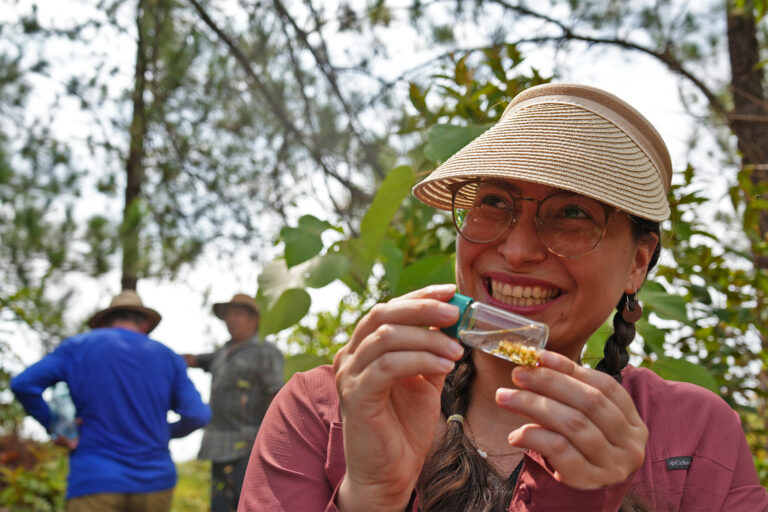ÑÜRÜM, Panama — Isidrio Hernandez-Ruiz has a soft spot for the bright yellow flowers of the guayacan trumpet tree (Tabebuia guayacan), a native species that blooms across Panama each spring. It’s one of many reasons why Hernandez-Ruiz, a rural farmer known locally as a campesino, chose to participate in a reforestation effort to plant native trees across his land that will soon earn him income — without harvesting them. Between the nonnative pines on his land now grows a mix of native trees that promise at least 20 years of payments for the carbon they sequester. Hernandez-Ruiz’s plot is part of a larger effort to give reforestation a do-over in Panama. The total project spans 100 hectares (247 acres) of planting across 45,000 hectares (111,000 acres) total in a rural district called Ñürüm in the Ngäbe-Buglé Comarca, an officially recognized Indigenous land. The project is co-led by the Smithsonian Tropical Research Institute (STRI) and the district’s traditional leadership with financial support from the Rohr Family Foundation and a grant from the U.K. government’s Global Centre on Biodiversity for Climate. Nearly 30 individuals and families chose to participate, and landowners keep full ownership of their land. The Ngäbe-Buglé Comarca is the largest Indigenous territory in the country, covering more than 9% of Panama’s land area and encompassing two Indigenous groups, the Ngäbe and the Buglé. In Ñürüm, the landscape has been heavily deforested over the decades from burning for cultivation, clear-cutting for cattle and government-sponsored plantations of nonnative pine and teak.…This article was originally published on Mongabay
Search
Recent Research
Want your Blog Article featured on our website?
Research
Featured News
Explaining Katsina’s Massive Leap to 2nd Position in the 2025 Climate Governance Ranking
In 2024, during the first edition of the Subnational Climate Governance Performance Rating and Ranking,
COP30: Firm to connect institutions with international climate finance opportunities
SISTME, a climate change and biodiversity conservation consulting firm based in Argentina, has offered to
From resistance to planetary governance, Indigenous women redefine global climate action
While world leaders negotiate behind closed doors in the Blue Zone of COP30, Indigenous Women
Sahara Group Foundation launches 16th Sahara Go Recycling Hub to boost environmental sustainability, economic empowerment
Sahara Group Foundation, the corporate social impact arm of Sahara Group, has commissioned its 16th
Climate finance is the lifeblood of climate action – Simon Stiell at COP30
Remarks delivered by UN Climate Change Executive Secretary, Simon Stiell, at the third High-Level Ministerial
UNDP, REA, GEF commission Plateau solar mini-grid to power agricultural value chains, empower rural communities
The United Nations Development Programme (UNDP), in partnership with the Rural Electrification Agency (REA) and
COP30: Africa urges world leaders to turn pledges into action
Africa has called on the world leaders to turn their pledges into action regarding the
Thousands join global marches calling on govts at COP30 to deliver climate justice
An estimated 30,000 people marched through the Brazilian city of Belém on Saturday, November 15,


